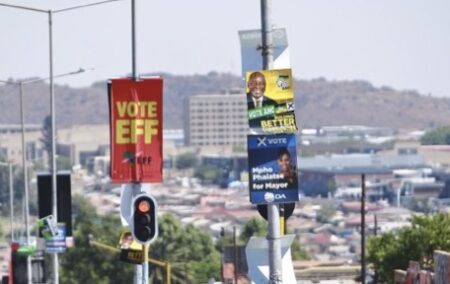As ANC NEC talks on power-sharing got under way in Johannesburg yesterday, three discussion documents obtained by Daily Maverick and tabled show the party’s possible options before the 16 June deadline.
News24 reported yesterday that provincial leaders insisted they first be apprised of options before talks begin. The ANC lost in KwaZulu-Natal and Gauteng.
The party is leaning toward a so-called ‘confidence and supply’ agreement, possibly with the DA and IFP as its preferred partners, but leaving the door open to other partners too.
Document 1 is written by a young, progressive intellectual in the ANC. It says: “A coalition agreement that impedes the renewal and transformation agenda of the ANC would be a marriage of convenience and would prioritise political expediency over the long-term effects on the ANC and the country as a whole.”
It argues that: “For these reasons, the ANC must exclude the Economic Freedom Fighters (EFF) and uMkhonto Wesizwe Party (MKP) from potential coalition candidates. Such a coalition risks undoing the substantial progress achieved by the ANC government to date.”
This document says the best option for the country’s stability is an ANC-DA-IFP power-sharing agreement: a coalition government, a so-called ‘confidence and supply’ agreement, or a government of national unity.
The preferred option is a ‘confidence and supply agreement’ in which the ANC holds executive power – perhaps with positions for the IFP – while the DA takes the Speaker and important committee positions.
The IFP is attractive for the ANC because its leaders have a good rapport. This will enable both parties to start rebuilding in KwaZulu-Natal, where they have been decimated by MK.
Document 2 is defined as: “A supply and confidence agreement, like the one used in Canada, is a formal arrangement between political parties where [one] or more supporting parties agree to support the government in exchange for key votes in exchange for policy concessions or involvement in the legislative process. This type of agreement is particularly crucial in minority government situations where the ruling party does not hold an outright majority in the legislature”.
It makes the system workable, otherwise the state could cease to function. The ANC negotiates with one or more other parties to gain their support. The goal is to ensure the government can survive critical votes in Parliament, particularly on Budget (supply) matters and significant legislation.
The supporting party or parties agree to vote with the government on important issues, primarily the Budget and any confidence motions. Confidence motions are critical, because a lost confidence vote can force the government to resign, possibly leading to a new election.
In return, the supporting parties negotiate for specific policy commitments. These might involve legislative actions, budgetary allocations or changes to proposed laws that align with the supporting party’s agenda.
The agreement sets out the duration and specific terms, including policies to be pursued and the conditions under which the parties might end the deal.
“This agreement can provide stability to a minority government by ensuring it has enough support to pass essential legislation and budgets. At the same time, it holds the government accountable to the supporting parties, reflecting a broader range of interests than the governing party alone might represent.”
“Supply and confidence agreements allow minority governments to function without formal coalitions, providing flexibility and ensuring that multiple political perspectives can influence government policy.”
The ANC will develop its positions before holding talks with other parties.
There is urgency here, as only 13 calendar days remain to make a deal and form a government.
Document 3, entitled “Scenarios for a coalition government”, sets out various scenarios for power-sharing. It points out that the ANC is not a junior negotiating partner.
“With the election results now over, the ANC remains the largest party in South Africa, securing a vote of 40.22%.”
The document blames the poor NC result on, inter alia, the “sponsored media” and the “moon-pack” parties (the moonshot pact has now been disbanded). It sets out five scenarios for ANC leaders to discuss.
It then weighs these scenarios against ANC policy priorities, voter share, previous work relationships and policy convergence, while ensuring a minimum of 51% in Parliament.
The document sets out criteria for making decisions on economic transformation, social transformation, growth, recapturing lost constituencies, defending democracy and freedoms won, the legacy and future of the ANC, and the stability of a coalition.
The paper ranks the various coalition options: #1 an ANC-EFF-PA coalition, #2 an ANC-EFF-IFP coalition, and #3 an ANC-MK-EFF coalition.
It cautions ANC leaders to “pay close attention to the sponsored narrative by the media and funded organisations with (a) mandate to bring regime change. There is no easy coalition; each has its own dynamic advantages and disadvantages”.
The anonymous ANC leader told Daily Maverick it was essential for any power-sharing arrangement to deal with economic exclusion, as this had fueled MK’s success.
He said the ANC should consider adding the EFF to the model of an ANC-DA-IFP ‘confidence and supply’ agreement that is gaining favour.

